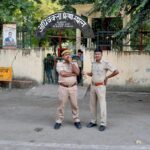The Bombay high court on Thursday said that in democracy a person has the right to express views, but it does not confer a license to violate the constitutional rights of others.
A bench of Justices S S Shinde and M S Karnik was hearing a petition filed by Sameet Thakkar, seeking to quash an FIR registered against him over his tweets against Maharashtra Chief Minister Uddhav Thackeray and his son, minister Aaditya Thackeray.
The V P Marg police station in Mumbai has registered a First Information Report against Thakkar for obscenity and slander.
On Thursday, his lawyer Abhinav Chandrachud argued that the Constitution gives every citizen the right to criticise those who hold a public office, even the prime minister.
Thakkar is facing a case for just two tweets which were not obscene, the lawyer said, adding that abusive language does not necessarily mean obscenity.
Illustration: Uttam Ghosh / KhabriBaba.com.
Chandrachud also cited Justice V R Krishna Iyer’s remark that courts should ignore trifling and venial offences.
The Supreme Court too had said that those holding public offices must be thick-skinned, the lawyer added.
The bench, however, disagreed.
“Sometimes we also receive very harsh criticism. We know that if we ignore it, everything will pass. But can we expect everyone to react in the same manner? Someone holding a public office might be very sensitive,” the HC said.
Advocate Chandrachud also argued that IPC sections 499 and 500, which deal with defamation, were slapped against Thakkar, but the complaint had been filed by a private person and not the chief minister who was allegedly defamed.
The judges, however, said that the dignity of a public office should be maintained.
“The rights of your client can not violate someone else’s constitutional rights. Everybody knows these rights are not absolute…. If criticism is fair then the person who occupies public office should have the capacity to accept it. But criticism can’t be unfair and abusive,” it said.
The high court also observed that it has become very easy to criticise someone on social media. “People now think they can get publicity if they post something against the PM or CM. You know now even judiciary is not immune. Before the pandemic everyday we used to keep getting so many letters,” the bench said.
Additional Public Prosecutor S R Shinde said the police had issued a notice to Thakkar under section 41-A of the Code of Criminal Procedure, but he was yet to appear before them to record his statement.
Such a notice is issued where arrest is not necessary and the maximum punishment for the offence is less than seven years.
Advocate Chandrachud said his client was willing to record his statement, but he did not do so fearing arrest.
“Our understanding is that there is no need for arrest when 41-A notice has been issued. You inform the investigating officer of the same,” the court told the government lawyer.
It directed Thakkar to appear before the police on October 5 and asked the government to inform the court if the police decided to book Thakkar under any additional charges that would warrant his arrest.




